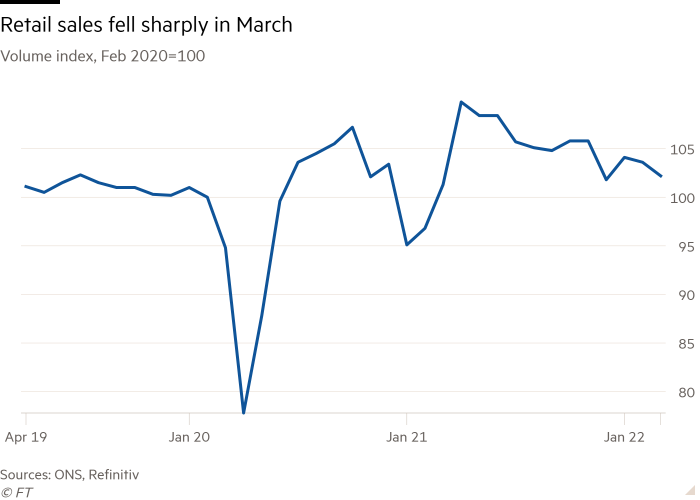Sterling fell to its weakest level since late 2020 after a sharp drop in British retail sales and a slowdown in business activity highlighted the extent of the cost of living crisis and surging inflation.
The volume of retail sales fell 1.4 per cent in March, the Office for National Statistics said, worse than the 0.3 per cent drop forecast in a Reuters poll and the second consecutive monthly decline.
This month’s flash purchasing managers’ index, compiled by S&P Global, also suggested that rises in energy and food prices were rapidly cooling activity in the economy. The index fell from 60.9 in March to 57.6 — the lowest reading since January and below economists’ expectations.
Friday’s retail and PMI figures prompted many economists to forecast that the Bank of England would raise interest rates less aggressively, triggering a 1 per cent drop in the pound against the US dollar to $1.289.

Thomas Pugh, economist at the consultancy RSM, said the retail data was the first official sign of the toll of high inflation on consumer spending and the economy. He warned of “worse to come” over the next few months, with the cost of living crisis likely to deteriorate in April, due to a jump in energy bills and taxes.
Annual inflation already hit a 30-year high when it surged to 7 per cent in March.
For sterling, “this is like a dam breaking”, Kit Juckes, an analyst at Société Générale, said of the retail figures, adding that the 1.5 percentage points of interest rate rises anticipated by the market for this year now looked unrealistic. With the pound having dropped below $1.30, the next likely target is $1.25, he said.
“Despite repeated upside inflation surprises, we think the Bank of England is likely to tread more carefully on rate rises than markets expect,” said James Smith, economist at ING. “It’s getting increasingly difficult to see how UK consumer spending avoids a downturn over the coming months.”

ONS data showed that online sales were hit particularly hard due to lower levels of discretionary spending. This slipped 7.9 per cent in March compared with the previous month, the largest monthly fall since January 2001. The drop followed a substantial contraction in February.
Fuel sales also fell substantially, by 3.8 per cent, with evidence suggesting some people reduced non-essential journeys following record high petrol prices.
Separate data released on Friday by the research company GfK showed that, in April, UK consumer confidence plunged to a near all-time low since records began in 1974, reflecting the impact of the cost of living crisis.
The data “surely quashes any remaining chance that the Monetary Policy Committee might raise the bank rate by [half a percentage point] next month, though a [quarter-point] hike still looks likely”, added Samuel Tombs, economist at Pantheon Macroeconomics.
The PMI figures will also intensify the dilemma at the Bank of England, whose governor, Andrew Bailey, said on Thursday it was walking a fine line between moderating inflation and turning the slowdown into a recession.
Increases in the cost of components bought by manufacturing companies reached an all-time high in the PMI survey’s 30 year history.
Some 84 per cent of manufacturing companies surveyed reported increased costs compared with three months ago, with 66 per cent of service sector firms also signalling a rise in operating expenses.
But the biggest problem noted by the survey was a drop off in the momentum of new business with companies reporting slower consumer demand with customer incomes squeezed. “Orders received by manufacturers have almost stalled, driven by an increasing loss of exports, and growth of demand for services has slumped to among the weakest since the lockdowns of early 2021,” added Chris Williamson, chief business economist at S&P Global.
The ONS data showed that shoppers only marginally reduced the value of what they spent on the high street, down 0.2 per cent, but with surging inflation, the volume of goods they were able to buy shrank significantly.
Jackie Mulligan, founder of ShopAppy, a website for local producers, said that “for countless small independent retailers, March was merciless. The small businesses that line the country’s high streets need our support more than ever.”


Comments are closed, but trackbacks and pingbacks are open.